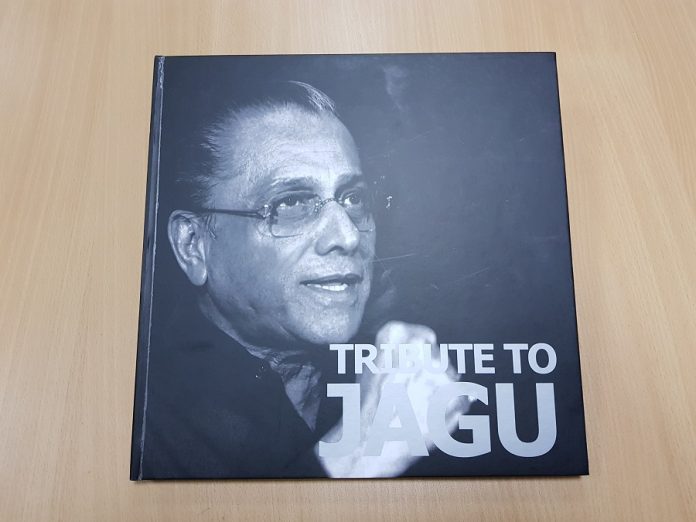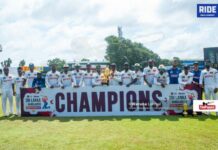It was heartening to see Sri Lanka Cricket honouring former Indian cricket supremo Jagmohan Dalmiya at the gala dinner last night.
Sometimes you wonder whether Sri Lanka’s heroics in the 1996 World Cup would have been ever possible if not for the business tycoon from Calcutta. Jagmohan Dalmiya was an absolute legend of the game and a true friend of Sri Lanka.
The late Mr. Dalmiya changed the economics of cricket. He did to the sport globally, what Kerry Packer had done to Australian cricket 20 years ago.
Sri Lanka’s acrimonious tour of Australia in 1995 was one of the toughest assignments ever undertaken by a team from our country. First there were ball tampering allegations in Perth, then the chucking controversy in Melbourne and finally the horrendous umpiring in the tri-nation final in Sydney that saw the team’s vice-captain Aravinda de Silva refusing to shake hands with Australian captain Mark Taylor after the game.
A month later, Australia were supposed to tour Sri Lanka for their World Cup group game and they expected a taste of their own medicine.
Two weeks before the World Cup got underway, the Central Bank bombing that left nearly hundred people dead was just the excuses the Aussies required to express their concerns of playing in Colombo. “A bomb might go off in Sri Lanka when I am shopping,” Shane Warne told the media. An angry Lakshman Kadirgamar, country’s renowned Foreign Minister and a former cricketer himself responded by saying, “Shopping is for sissies.”
Dalmiya’s business acumen saw him selling television rights of the 1996 World Cup for a sum of US$ 75 million. It was the highest telecasting revenue ever received at that point. Dalmiya didn’t want any dramas. He did much to convince Australia, but to avail. West Indies too joined Australia and there was danger of Zimbabwe and Kenya giving in for the pressure and pulling out as well.
Dalmiya was the BCCI Secretary then. The organizing arm of the World Cup was known as PILCOM (Pakistan, India and Lanka Committee) Dalmiya was the convenor of the committee. He was pressurized by Australia and West Indies to move the Sri Lankan games either to India or Pakistan. This Dalmiya didn’t want to do as Sri Lanka had put in a huge effort for the sport’s showpiece event.
Eventually the master tactician came up with a master plan. He decided to put together a joint India-Pakistan team to play a friendly game in Sri Lanka to show that Colombo was safe.
There were a few other problems that Dalmiya encountered. Given the sour relationship between nuclear neighbours India and Pakistan, it was unimaginable for an Indian captain to play under a Pakistan or vice-versa. But he came up with an ingenious plan.
Dalmiya called up former Pakistan captain Inthikab Alam and told him, “Look here, this team has so many stars. There’s Wasim, Waqar, Sachin, Azhar and all the best players in Asia. The most important thing here is to manage all these stars. So can you become the Manager?” Alam, a former leg-spinner and a lovely man, agreed without any hesitation.
So once the Manager’s position went to Pakistan, it was only reasonable that an Indian became a captain. Hence Mohammad Azharuddin was made the skipper. Inthikab convinced Wasim to play under Azhar.
There was another problem. Wills, the tournament sponsors had signed a multi million dollar contract with the tournament organizers and one of the clauses was that no games should take place two weeks prior to the tournament. The friendly match in Colombo was in breach of the agreement. Dalmiya had another clever answer. He called up the sponsors and said, “You will never find another occasion where India and Pakistan play together. You should in fact pay me more for putting your logo in the players’ clothing.” The sponsors agreed and the team was known as India-Pakistan Wills XI.
Sri Lanka responded generously. Late Mr. Kadirgamar convinced the government that the visiting team should be accorded security that is provided to Heads of State. The game went without any trouble. This helped the organizers to argue that security was fine in Colombo.
With Australia and West Indies not changing their stance, Dalmiya decided that Sri Lanka be awarded the points of that game and it went a long way in helping Sri Lanka top the group with maximum points.
Dalmiya’s timely intervention saved Sri Lanka from cricketing isolation. In 1987 when a bomb went off in Colombo with New Zealand touring the country not only was the tour canceled, but Sri Lanka were unable to host any tours for the next five years. Dalmiya’s actions ensured that cricket in Sri Lanka went ahead without any trouble and Australia themselves toured the island later that year.
During the function hosted by SLC on Thursday in Colombo, former ICC Chairman Eshan Mani, a London based Accountant, remembered how Dalmiya would call him up at 9pmEngland time to discuss organizing of the World Cup. He recalled that time in Calcutta at that point was 2am. But Dalmiya was awake. He left no stone unturned to make sure the tournament was a resounding success.
Dalmiya was the first Asian to become the President of ICC. Single-handedly he fought Australia and England and ensured that the veto power the two countries enjoyed was made null and void.
Honouring Dalmiya has been long overdue as he was a true friend of Sri Lankan cricket. The ultimate joy for him was to see Sri Lanka going onto win that World Cup.
While congratulating SLC, we would like to also remind on someone whom the board missed out on appreciating. Abdul Hafeez Kardar, who made his Test debut for India was the first Pakistani captain after partisan. A powerful Minister of the Ali Bhutto government, he went onto become the Chairman of Pakistan Cricket Board. He did much to ensure that Sri Lanka gained Test status by arguing our case at ICC meetings in 1970s. He deserves as much recognition as Mr. Dalmiya.














